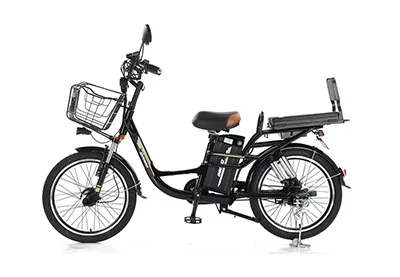9 月 . 04, 2024 16:55 Back to list
electric bicycle
The Rise of Electric Bicycles Revolutionizing Urban Mobility
In recent years, electric bicycles, often referred to as e-bikes, have surged in popularity across the globe. As cities grapple with traffic congestion, environmental concerns, and the need for efficient transportation solutions, e-bikes emerge as a compelling alternative to traditional modes of travel. By combining the familiar mechanics of a bicycle with electric propulsion, these innovative vehicles are reshaping urban mobility and encouraging a more sustainable lifestyle.
One of the primary attractions of e-bikes is their ability to make cycling accessible to a wider audience. Unlike conventional bicycles, which require significant physical effort, e-bikes are equipped with an electric motor that assists the rider’s pedaling. This feature is particularly beneficial for individuals who may find traditional cycling daunting, such as those with physical limitations, the elderly, or commuters who might otherwise opt for a car due to the physical exertion involved in biking.
Moreover, e-bikes offer significant advantages for urban commuting. They allow riders to cover longer distances faster, effectively reducing commute times. This efficiency can discourage car usage, thereby alleviating road congestion and decreasing the demand for parking spaces in crowded urban areas. As cities become increasingly congested, e-bikes provide a practical solution for moving around efficiently, particularly in densely populated regions where traffic jams are commonplace.
electric bicycle

From an environmental perspective, e-bikes are a greener alternative to fossil fuel-powered vehicles
. The shift towards electric bicycles can significantly lower city pollution levels and reduce carbon footprints. Since e-bikes produce zero emissions during operation, they contribute to cleaner air quality and promote healthier urban environments. Furthermore, many e-bikes are designed with sustainability in mind, incorporating eco-friendly materials and technologies.The rise of e-bike sharing programs is another trend fueling their popularity. Cities around the world are introducing shared e-bike schemes, enabling residents and visitors to access electric bicycles easily without the need for personal ownership. These programs not only promote cycling as a mode of transport but also encourage a sharing economy that prioritizes resources over personal ownership, ultimately benefitting the environment and the community.
Despite their many advantages, the adoption of e-bikes does come with challenges. Issues such as safety, regulations, and infrastructure must be addressed to ensure that e-bikes can be integrated smoothly into existing transportation networks. Improved bike lanes, public awareness campaigns about road sharing, and clear regulations can help mitigate potential conflicts between e-bikes, traditional cyclists, and pedestrians.
In conclusion, electric bicycles represent a transformative development in urban transportation. With their ability to enhance mobility, reduce environmental impacts, and foster healthier lifestyles, e-bikes are poised to become a staple of modern cities. As technology continues to advance and more individuals recognize the benefits of e-bikes, their role in sustainable urban development will undoubtedly grow, leading to a cleaner, more efficient, and more accessible future for all.
-
The Main Application Scenarios of Mountain Bike
NewsOct.29,2024
-
Suggestions for Selecting and Maintaining Mountain Bike
NewsOct.29,2024
-
Characteristics of Kids Balance Bike
NewsOct.29,2024
-
Characteristics of Baby Stroller
NewsOct.29,2024
-
Characteristics and Advantages of Mountain Bike
NewsOct.29,2024
-
Baby Stroller Purchasing Suggestions
NewsOct.29,2024
-
Suggestions for Purchasing Kids Balance Bike
NewsOct.09,2024

